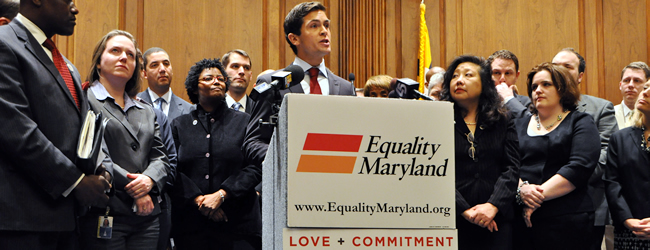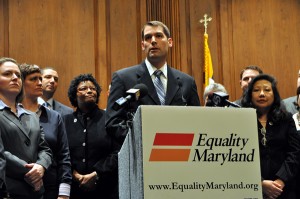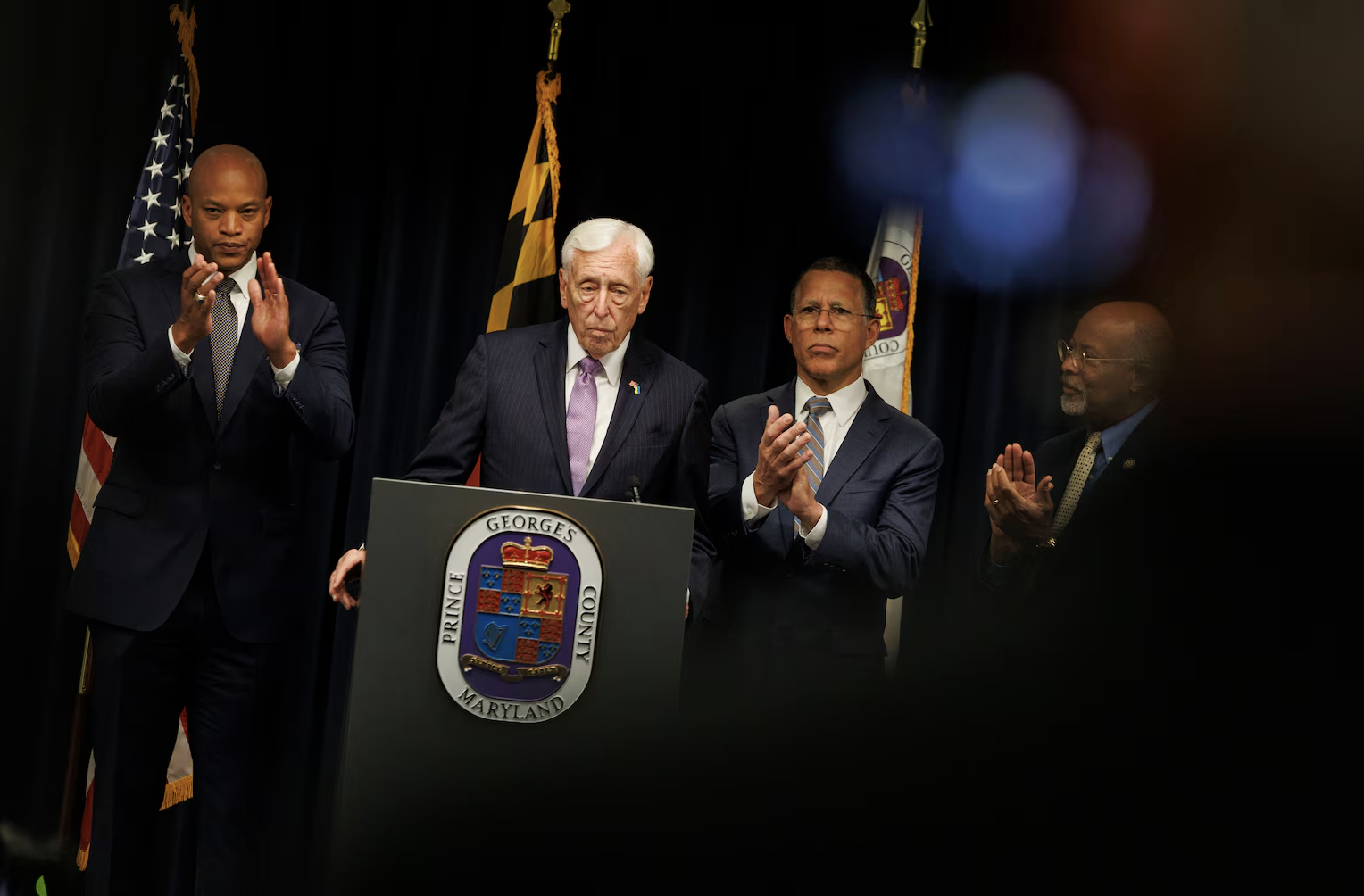Local
Lawmakers hail introduction of Md. marriage bill
Vote in Senate expected in February


Maryland Sen. Rob Garagiola at the podium. State Del. Mary Washington is to his right. (Blade photo by Michael Key)
Members of the Maryland Legislature joined LGBT activists at a news conference at the state capitol in Annapolis Tuesday to formally launch a campaign to pass a same-sex marriage bill that backers introduced the previous week.
The Religious Freedom and Civil Marriage Protection Act is expected to come up for a committee hearing in the State Senate the first week of February and likely will be sent to the Senate floor for debate and a vote as soon as Feb. 7, according to sources familiar with the measure.
Political insiders have said they believe supporters have the votes this year to pass the measure in the Senate, where it has died in committee in past years. And sources claim the House has had the necessary votes for some time to pass it.
“I am very proud to be a sponsor of this legislation,” said House of Delegates Majority Leader Kumar Barve (D-Mont. County), who holds the No. 2 leadership position in that body. “This bill is a testament to what it means to be an American and what it means to be free and equal in our society.”
Barve was one of more than 25 lawmakers and LGBT advocates and their supporters who attended the Jan. 25 news conference in Annapolis.
Sen. Rob Garagiola (D-Mont. County), the Senate Majority Leader and a sponsor of the marriage bill, told the gathering that gay and straight couples are “no different” in their capacity to love one another.
“It’s time that the rights already enjoyed by many who can obtain a marriage license in Maryland are enjoyed by all regardless of gender and sexual orientation,” he said.
The official registry of bills on the Maryland Legislature’s website shows that the Religious Freedom and Civil Marriage Protection Act was introduced in the House of Delegates on Jan. 20 with 17 sponsors and referred to the Committee on the Judiciary.
The registry shows that the marriage bill was introduced in the Senate on Jan. 21 with 18 sponsors, including Garagiola and Richard Madaleno (D-Montgomery County), who is gay. It was sent to the Senate Judicial Proceedings Committee.
Morgan Meneses-Sheets, executive director of the statewide LGBT group Equality Maryland, the lead advocate for the bill, said another copy of the identical bill was introduced in the House of Delegates Tuesday with 56 sponsors, including Barve, whose name was not on the first House bill introduced last week.
“This is the bill we will be pushing,” she said. “It’s very common to introduce more than one bill. It happens all the time.”
The two-page bill calls for amending the state’s family law, which currently says, “Only a marriage between a man and a woman is valid in this state.” The new language in the Religious Freedom and Civil Marriage Protection Act would rewrite that provision to state, “Only a marriage between two individuals who are not otherwise prohibited from marrying is valid in this state.”
A second provision in the bill states that “an official of a religious institution or body authorized to solemnize marriages may not be required to solemnize any marriage in violation of the right to free exercise of religion guaranteed by the First Amendment to the United States Constitution and by the Maryland Constitution and Maryland Declaration of Rights.”
Backers say the latter provision, which is similar to a provision in D.C.’s same-sex marriage law, is aimed at assuring religious leaders that churches and other faith-based institutions cannot be forced to perform same-sex marriages.
Equality Maryland and the national same-sex marriage advocacy group Freedom to Marry jointly sponsored the Tuesday news conference.
Officials with both groups said they were hopeful that growing support for same-sex marriage in the state, as reflected in public opinion polls, would help supporters beat back a well-funded opposition campaign by the National Organization for Marriage (NOM) to defeat the bill.
NOM President Brian Brown said the group would immediately file a petition to bring a same-sex marriage bill before voters in a referendum if the legislature passes it and Gov. Martin O’Malley signs it. O’Malley, a Democrat, has said he would sign the bill if the legislature passes it.
A statewide poll commissioned by the Washington Post and released this week shows that 51 percent of Maryland voters favor a law allowing same-sex couples to marry, while 44 percent oppose such a law. Five percent had no response on the issue.
The same poll showed O’Malley had a job approval rating 58 percent, the highest approval he’s had since becoming governor, according to the Post. Thirty percent of those polled disapprove of O’Malley’s job performance and 13 percent were not sure, the poll shows.
Although O’Malley’s stated commitment to sign a marriage bill has been widely reported in the media, the high approval rating hasn’t changed his decision not to take an active role in lobbying for the marriage bill.
And in a related development, O’Malley released his legislative agenda for the 2011 session of the legislature that includes at least 15 bills addressing a variety of issues, including healthcare, gun control, child welfare and promotion of electric vehicles.
Missing from O’Malley’s legislative agenda are the marriage bill and a separate bill expected to be introduced this year to ban employment discrimination against transgender residents.
Asked why O’Malley didn’t include the marriage and transgender bills in his agenda list, his press secretary, Shaun Adamec, said in an e-mail that the governor includes only those bills he introduces himself in his agenda list. Adamec said O’Malley supports additional bills that members of the legislature introduce and that he fully supports and plans to sign both the marriage bill and transgender rights bill.
“The Governor has been very clear that achieving equity for all Marylanders continues to be a priority of his,” Adamec said.
“We are here today as part of a growing movement across the country toward fairness and respect for all families,” said Sean Eldridge, political director of Freedom to Marry, at Tuesday’s news conference.
“Same-sex couples are now free to marry in five states and next door in the District of Columbia, as well as a dozen countries worldwide,” he said. “And in each of these places, the sky has not fallen, and families have been helped, with no one hurt. Because there is no good reason to continue excluding same-sex couples from marriage, Freedom to Marry supports the work of our Maryland partners to pass the Religious Freedom and Civil Marriage Protection Act,” he said.
“Make no doubt about it – Maryland is ready for marriage equality, and we will not stop until it is no longer denied to our families,” said Del. Heather Mizeur (D-Montgomery County), one of five lesbian members of the House of Delegates.
Virginia
Gay Va. State Sen. Ebbin resigns for role in Spanberger administration
Veteran lawmaker will step down in February

Alexandria Democrat Adam Ebbin, who has served as an openly gay member of the Virginia Legislature since 2004, announced on Jan. 7 that he is resigning from his seat in the State Senate to take a job in the administration of Gov.-Elect Abigail Spanberger.
Since 2012, Ebbin has been a member of the Virginia Senate for the 39th District representing parts of Alexandria, Arlington, and Fairfax counties. He served in the Virginia House of Delegates representing Alexandria from 2004 to 2012, becoming the state’s first out gay lawmaker.
His announcement says he submitted his resignation from his Senate position effective Feb. 18 to join the Spanberger administration as a senior adviser at the Virginia Cannabis Control Authority.
“I’m grateful to have the benefit of Senator Ebbin’s policy expertise continuing to serve the people of Virginia, and I look forward to working with him to prioritize public safety and public health,” Spanberger said in Ebbin’s announcement statement.
She was referring to the lead role Ebbin has played in the Virginia Legislature’s approval in 2020 of legislation decriminalizing marijuana and the subsequent approval in 2021of a bill legalizing recreational use and possession of marijuana for adults 21 years of age and older. But the Virginia Legislature has yet to pass legislation facilitating the retail sale of marijuana for recreational use and limits sales to purchases at licensed medical marijuana dispensaries.
“I share Governor-elect Spanberger’s goal that adults 21 and over who choose to use cannabis, and those who use it for medical treatment, have access to a well-tested, accurately labeled product, free from contamination,” Ebbin said in his statement. “2026 is the year we will move cannabis sales off the street corner and behind the age-verified counter,” he said.
Maryland
Steny Hoyer, the longest-serving House Democrat, to retire from Congress
Md. congressman served for years in party leadership

By ASSOCIATED PRESS and LISA MASCARO | Rep. Steny Hoyer of Maryland, the longest-serving Democrat in Congress and once a rival to become House speaker, will announce Thursday he is set to retire at the end of his term.
Hoyer, who served for years in party leadership and helped steer Democrats through some of their most significant legislative victories, is set to deliver a House floor speech about his decision, according to a person familiar with the situation and granted anonymity to discuss it.
“Tune in,” Hoyer said on social media. He confirmed his retirement plans in an interview with the Washington Post.
The rest of this article can be found on the Baltimore Banner’s website.
District of Columbia
Kennedy Center renaming triggers backlash
Artists who cancel shows threatened; calls for funding boycott grow

Efforts to rename the Kennedy Center to add President Trump’s name to the D.C. arts institution continue to spark backlash.
A new petition from Qommittee , a national network of drag artists and allies led by survivors of hate crimes, calls on Kennedy Center donors to suspend funding to the center until “artistic independence is restored, and to redirect support to banned or censored artists.”
“While Trump won’t back down, the donors who contribute nearly $100 million annually to the Kennedy Center can afford to take a stand,” the petition reads. “Money talks. When donors fund censorship, they don’t just harm one institution – they tell marginalized communities their stories don’t deserve to be told.”
The petition can be found here.
Meanwhile, a decision by several prominent musicians and jazz performers to cancel their shows at the recently renamed Trump-Kennedy Center in D.C. planned for Christmas Eve and New Year’s Eve has drawn the ire of the Center’s president, Richard Grenell.
Grenell, a gay supporter of President Donald Trump who served as U.S. ambassador to Germany during Trump’s first term as president, was named Kennedy Center president last year by its board of directors that had been appointed by Trump.
Last month the board voted to change the official name of the center from the John F. Kennedy Memorial Center For The Performing Arts to the Donald J. Trump And The John F. Kennedy Memorial Center For The Performing Arts. The revised name has been installed on the outside wall of the center’s building but is not official because any name change would require congressional action.
According to a report by the New York Times, Grenell informed jazz musician Chuck Redd, who cancelled a 2025 Christmas Eve concert that he has hosted at the Kennedy Center for nearly 20 years in response to the name change, that Grenell planned to arrange for the center to file a lawsuit against him for the cancellation.
“Your decision to withdraw at the last moment — explicitly in response to the Center’s recent renaming, which honors President Trump’s extraordinary efforts to save this national treasure — is classic intolerance and very costly to a non-profit arts institution,” the Times quoted Grenell as saying in a letter to Redd.
“This is your official notice that we will seek $1 million in damages from you for this political stunt,” the Times quoted Grenell’s letter as saying.
A spokesperson for the Trump-Kennedy Center did not immediately respond to an inquiry from the Washington Blade asking if the center still planned to file that lawsuit and whether it planned to file suits against some of the other musicians who recently cancelled their performances following the name change.
In a follow-up story published on Dec. 29, the New York Times reported that a prominent jazz ensemble and a New York dance company had canceled performances scheduled to take place on New Year’s Eve at the Kennedy Center.
The Times reported the jazz ensemble called The Cookers did not give a reason for the cancellation in a statement it released, but its drummer, Billy Hart, told the Times the center’s name change “evidently” played a role in the decision to cancel the performance.
Grenell released a statement on Dec. 29 calling these and other performers who cancelled their shows “far left political activists” who he said had been booked by the Kennedy Center’s previous leadership.
“Boycotting the arts to show you support the arts is a form of derangement syndrome,” the Times quoted him as saying in his statement.
-

 National4 days ago
National4 days agoWhat to watch for in 2026: midterms, Supreme Court, and more
-

 District of Columbia5 days ago
District of Columbia5 days agoTwo pioneering gay journalists to speak at Thursday event
-

 a&e features5 days ago
a&e features5 days agoQueer highlights of the 2026 Critics Choice Awards: Aunt Gladys, that ‘Heated Rivalry’ shoutout and more
-

 Colombia5 days ago
Colombia5 days agoBlade travels to Colombia after U.S. forces seize Maduro in Venezuela


















